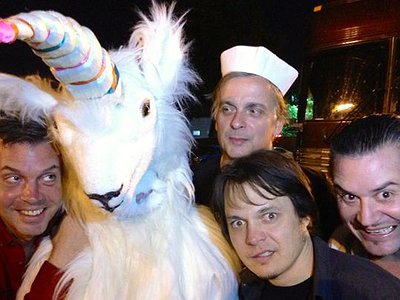In how much, do you feel, are creative decisions shaped by cultural differences – and in how much, vice versa, is the perception of sound influenced by cultural differences?
There is no way to know how much. Of course all decisions, creative or not, are in someway affected by the culture they reside within. The lifestyle one is born into or organically migrates toward is going to have some bearing, regardless of how small, on an individual's creative process. And for the second part of this question, the differences in, say, Eastern and Western music and the training that the ears of those cultures are subject to are well documented.
The relationship between music and other forms of art – painting, video art and cinema most importantly - has become increasingly important. How do you see this relationship yourself and in how far, do you feel, does music relate to other senses than hearing alone?
As a fan of films and film music, and as someone who writes film music, the relationship is a close one. I would also say that I am still a student of this relationship in that I am continuously trying to understand its balance and find cohesion. I believe that all art forms are really just different shapes of the same thing, the same muse or passion.
There is melody, counterpoint, harmony and rhythm in painting, for example check out Paul Klee. Our senses are merely tools for understanding and how we mentally interpret and utilize that understanding is subjective. Music, and art in general, is just stimulus begging response.
There seem to be two fundamental tendencies in music today: On the one hand, a move towards complete virtualisation, where tracks and albums are merely released as digital files. And, on the other, an even closer union between music, artwork, packaging and physical presentation. Where do you stand between these poles?
I still think about music in the same way I always have. When it comes to creating music it's about getting the ideas out of my head, onto paper or into sound files and then finding an audience. As a listener, I still partake in every medium as I always have. I have a cassette player in my car, I travel with an iPod and I still purchase used vinyl and listen to it on a turntable at home.
Packaging and presentation go under the larger heading of 'marketing' which will always evolve with the times. Of course, I grew up in the '70s & '80s and I am nostalgic for artwork, liner notes with production information and album covers, but I am from an old-fashioned, endangered audience. There is not a lot I can or should do about that. The tendencies of the industry, market, production etc, are there for a reason.
The role of an artist is always subject to change. What's your view on the (e.g. political/social/creative) tasks of artists today and how do you try to meet these goals in your work?
I don't know if I agree with this statement. My 'role' as an artist is to be an artist, whatever that term means to me. And whatever change I am subject to, by the outside world or by my own inner growth, will manifest not as a goal but as personal direction leading to somewhere that, I would guess, has no end.
How an artist chooses to present his task is subjective. To each his own. The way I try to meet my own personal goals is to become a better artist, a better musician, and to continue to learn and absorb. In other words, my role is my own business. If what I create makes someone think, then that is great. What they think about and what they do with those thoughts is not my responsibility, it is theirs.
Music-sharing sites and -blogs as well as a flood of releases in general are presenting both listeners and artists with challenging questions. What's your view on the value of music today? In what way does the abundance of music change our perception of it?
There is too much music. I can't keep up, especially not as a listener. But I get to what I can and in that I have to sift through the crap to get to what is good, which is something we've always had to do as listeners. I don't think the abundance devalues the music because there are still plenty of artists doing quality work.
Technology has certainly aided unknown, obscure artists, but it's also allowed more crap to be more readily available. The upshot of this is that it forces us to be more discerning more quickly. How we deal with the overload of information depends on our individual capacity. Personally, I can say that there are probably ten records that I value greatly and that I continue to return to year after year.





